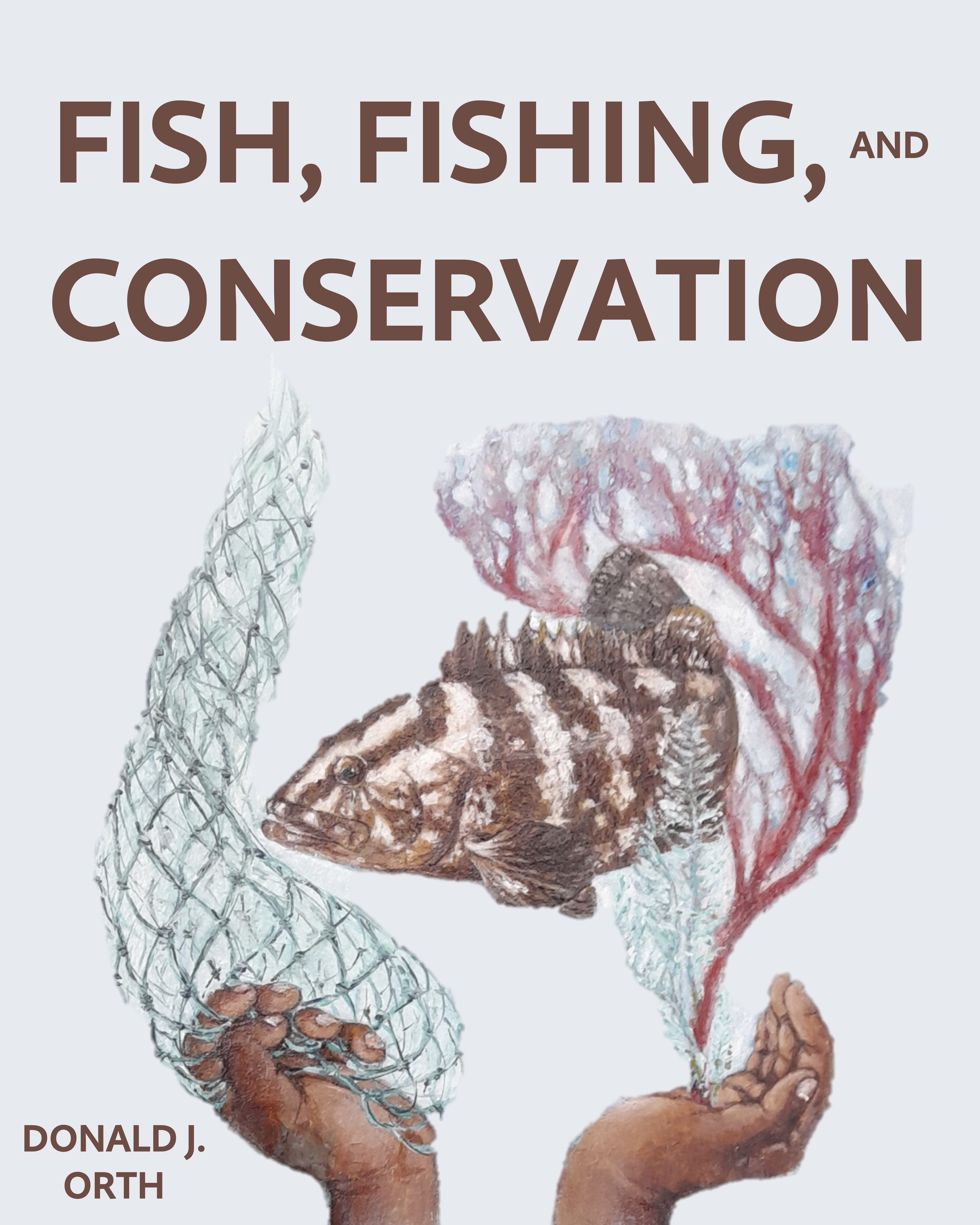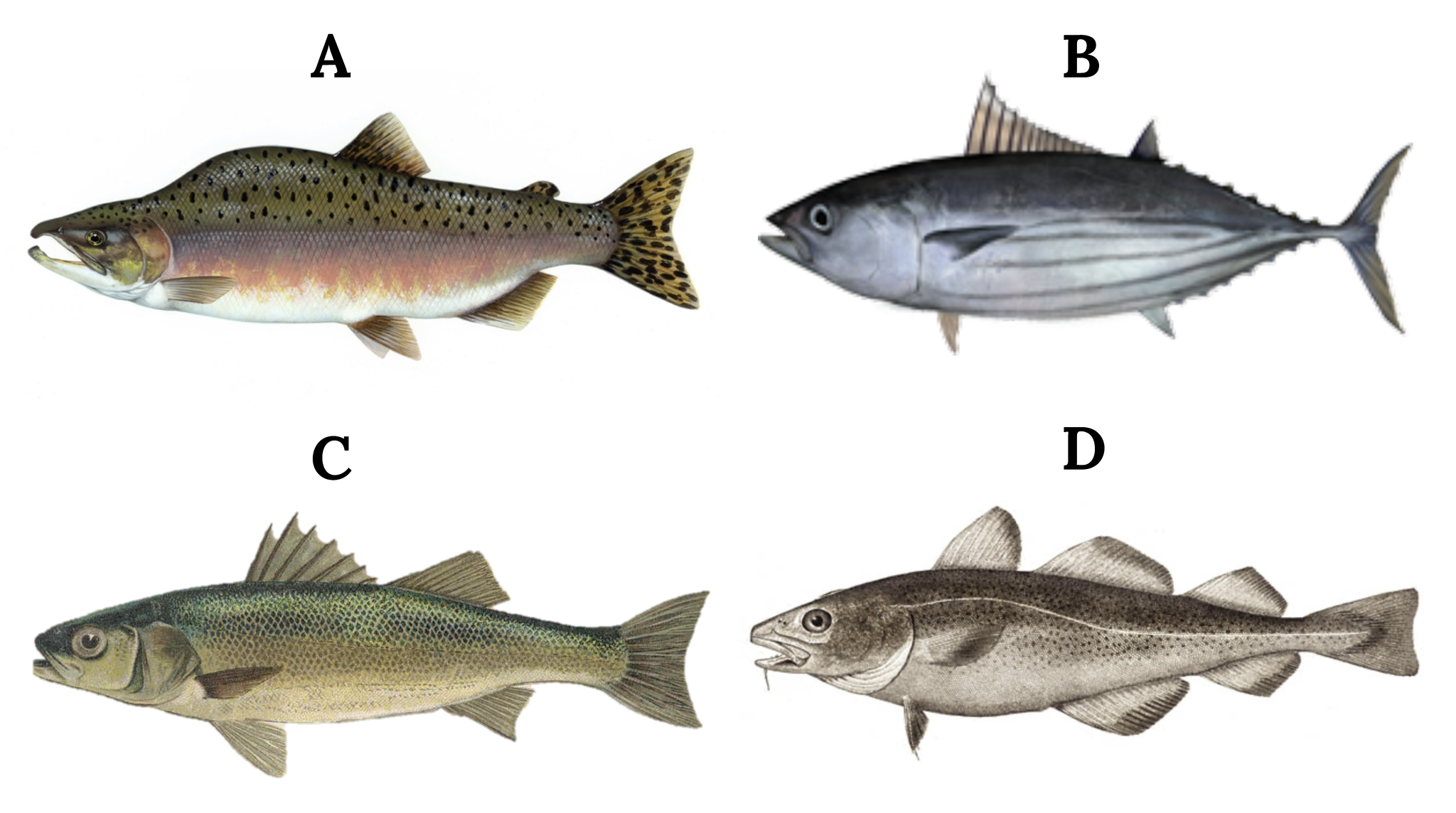Open@VT
Open Access, Open Data, and Open Educational Resources
Announcing a New Open Textbook: Fish, Fishing, and Conservation

The Open Education Initiative at Virginia Tech is pleased to announce a new peer-reviewed open textbook, Fish, Fishing and Conservation (2023) by Donald J. Orth, Ph.D. of Virginia Tech https://doi.org/10.21061/fishandconservation
Are you an instructor reviewing or adopting this book for an instructional purpose? Instructors adopting or reviewing this text are encouraged to record their use at https://bit.ly/fishandconservation_interest. This helps the book’s sponsors to understand this open textbook’s impact.
Fish, Fishing, and Conservation is a 389-page, peer-reviewed open textbook intended for undergraduate students who are exploring majors in Fish & Wildlife. It is also relevant to a general audience or for use in courses which explore social and ethical aspects of fish, fishing and conservation. Read a review of this book.
People, places, and approaches to fishing are as varied as the diverse fish fauna that exist on the planet. As conservation planners recognize the value of substantial engagement of stakeholders in decision making and ineffectiveness of rigid top-down management approaches, Fish, Fishing, and Conservation asserts that all peoples must play a role in conservation. Through case studies, engaging narrative and graphics, and exercises, text explores major motivations for fishing and non-fishing related values, responsible fisheries practices, the rights of all people to decide how to manage and conserve fish, their habitats, and how they are utilized in the context of overfishing as a pressing global problem for which appropriate solutions are not easily found nor implemented.
Introductory chapters examine fish, fishing, and why fish matter and examine the role of values in driving conservation initiatives. Fish and their unique sensory capabilities are described along with a review of recent studies to examine issues of pain, sentience, and learning in fishes living in a foreign, underwater world. The text incorporates these new findings in conservation and management leading readers to evaluate and adopt suitable approaches to ethical reasoning which consider the welfare needs of wild and cultured fishes. Later chapters focus on the role of gender in fishing, conservation organizations, recreational fishing, and a focus on specific fisheries that reveal the principles of conservation and management as they play out in major controversies. Additionally, the textbook contains audio recordings of professional profiles by Virginia Tech students. These are linked at the beginning of each end-of-chapter Professional Profile. Audio recordings are also available on Spotify.
Additional teaching resources including a sample syllabus, course schedule, and selected assignments related to this book are available at http://hdl.handle.net/10919/115425.
Instructors are encouraged to join and share their relevant, original, and openly-licensed teaching resources via the Fish, Fishing, and Conservation Instructor Portal in OER Commons.
Versions of this Book
ISBN PDF 978-1-957213-27-9
ISBN Print 978-1-957213-28-6 https://www.amazon.com/dp/1957213280
ISBN Pressbooks 978-1-957213-31-6 https://pressbooks.lib.vt.edu/fishandconservation
ISBN ePub 978-1-957213-29-3
Table of Contents
1. Fish, Fishing, and Why They Matter
2. Values Drive Fish Conservation
3. Sensory Capabilities of Fish
4. Ethical Reasoning and Conservation Planning
5. Pain, Sentience, and Animal Welfare
6. Public Aquariums and Their Role in Education, Science, and Conservation
7. Gender and Fishing
8. Angling and Conservation of Living Fishy Dinosaurs
9. Fly Fishing’s Legacy for Conservation
10. Recreational Fishing and Keep Fish Wet
11. Integrating Fishers in the Management of Arapaima
12. Conserving Tunas: The Most Commercially Valuable Fish on Earth
13. Groupers and Spawning Aggregations
14. Menhaden and Forage Fish Management
15. Takeaways for Successful Fish Conservation
Suggested Citation Orth, Donald J. (2023). Fish, Fishing, and Conservation. Blacksburg: Virginia Tech Department of Fish and Wildlife Conservation. https://doi.org/10.21061/fishandconservation. Licensed with CC BY 4.0.
About the Author Donald J. Orth is the Thomas H. Jones Professor in the Department of Fish and Wildlife Conservation at Virginia Polytechnic Institute and State University. He has taught the following courses: Ichthyology, Stream Habitat Management, Fisheries Management, Fish Population Dynamics, Fish, Fishing, and Conservation, and First-Year Experience in Natural Resources. His principal interests are in population and community ecology, stream fish ecology, regulated rivers, instream flow and stream habitat assessment, fisheries management, and fish population dynamics. He has guided numerous undergraduate research projects and advised 33 graduate students during his career.
Don attended Eastern Illinois University (BS) and Oklahoma State University (MS and PhD). He is a Life Member of the American Fisheries Society and a Certified Fisheries Professional. He is also a Fellow of the American Fisheries Society, the American Institute of Fisheries Research Biologists, and the Virginia Natural Resources Leadership Institute. Don has published more than 150 primary papers and 50 technical reports on fish, fisheries, and riverine management. Much of his research was also communicated with a general audience in over 180 popular articles. He has received numerous awards for his teaching and contributions to conservation and public outreach. Most recently, the Virginia Chapter of the American Fisheries Society awarded him the Eugene W. Surber Award for years of significant contributions to the field of fisheries science.

Figure: The four most consumed food fish are: (A) Pink Salmon, (B) Skipjack Tuna, (C) European Sea Bass, and (D) Atlantic Cod. (See figure attribution below)
Found an Error? Tell us
Report an Error
View Errata
Funding and Project Support
The project was funded in part by a VIVA Open grant from VIVA, Virginia’s Academic Library Consortium. Development, editorial, graphic design, accessibility and publication assistance was provided by the Open Education Initiative of the University Libraries at Virginia Tech.
The work is published by the Virginia Tech Department of Fish and Wildlife Conservation in association with the Open Education Initiative at the University Libraries and Virginia Tech Publishing.
Cover Art: Nora Ligus
Cover design: Kindred Grey
Figure attribution: The four most consumed food fish are: (A) Pink Salmon, (B) Skipjack Tuna, (C) European Sea Bass, and (D) Atlantic Cod. Kindred Grey. 2022. CC BY 4.0. Includes Pink Salmon FWS by Timothy Knepp, 2001 (public domain, https://commons.wikimedia.org/wiki/File:Pink_salmon_FWS.jpg), Katsuwonus pelamis by NOAA FishWatch, 2012 (public domain, https://commons.wikimedia.org/wiki/File:Katsuwonus_pelamis.png), FMIB 51236 Bass (Labrax lupus) by Reinhold Thiele, 1904 (public domain, https://commons.wikimedia.org/wiki/File:FMIB_51236_Bass_(Labrax_lupus).jpeg), and Atlantic cod by NOAA Photo Library, 2004 (public domain, https://commons.wikimedia.org/wiki/File:Atlantic_cod.jpg).